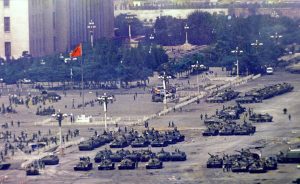Thirty-three years ago, protestors flooded the streets of Beijing holding signs reading “down with dictators” and “liberty or death.” They headed to Tiananmen Square, where students stood in the middle of circular clearings in the crowd, demanding democracy through megaphones. The air was thick with excitement and potential. It was the younger generation that led the calls for change, but we were joined by a million of our fellow citizens.
While Tiananmen Square was sparking in protest, those in the Uyghur region joined them in calling for reform. The period following the Cultural Revolution had seen more freedom for the Uyghur people – mosques reopened and our cultural rights were gradually being restored. It felt as though we had an opportunity to secure a democratic future, free from the violent crackdowns and repression that plagued our parents’ generation.
But all of this hope was extinguished when, on June 4, 1989 the Chinese government rolled military tanks into the square and opened fire on their own citizens. What we thought was the beginning of a movement was actually the end of any vision for a democratic China. The Chinese Communist Party secured decades of deference by exhibiting some of the most violent repression the modern world had seen. An entire generation of democracy activists were killed and imprisoned that day and in the months that followed. The sacrifices that we made were met with brutality from our own government, and inaction from others across the world.
This would prove to be a turning point, not just for the People’s Republic of China, but also for global authoritarianism. The international community was at a crossroads in 1989 – they were choosing between defending human rights or appeasing rights abusers. Initially, the Western world placed sanctions on the Chinese state and condemned the massacre. But the desire to open the door soon led to re-engagement both economically and diplomatically. At the time, this was justified by the misguided theory that, through appeasement, the West could influence China to improve its human rights record and nurture the liberation movement. Some still parrot this argument. It was, and continues to be, a ridiculous and dangerous notion for those of us that have experienced the Chinese regime’s brutality first-hand. When Western leaders chose to welcome China back into the global community after Tiananmen, they told our oppressors that the world was willing to accept their transgressions. We have been paying the price ever since.
The Uyghurs are among some of the worst victims of the unchecked repression that succeeded the Tiananmen Square Massacre. While our people had suffered state-violence for decades, we could not have foreseen the genocide we now face. Our homeland has been turned into a high-tech open-air prison, women are forcibly sterilized, children are taken from their families and millions of our fellow Uyghurs have been locked in concentration camps. Those of us in exile cannot contact our families, instead we are left to wonder about their safety.
Unlike 33 years ago, when images of the massacre were splashed over the world’s front pages, there is a scarcity of visual evidence of the atrocities currently being perpetrated against our people. Over the past five years, barely any information has escaped the region. The Chinese government realizes that this is what is needed to stem the kind of international outrage that erupted in 1989. However, last week a rare and significant cache of documents and photographs, known as the “Xinjiang Police Files,” was leaked. This included thousands of pictures of Uyghur detainees, some as young as 15 years old. The fear on their faces is arresting. Finally, the international community is forced to look directly into the eyes of those they have betrayed with their inaction. The Uyghur diaspora were thinking of our loved ones as we looked through the images, many literally searching for missing family members among the faces, all of us wrapped in anxiety for those we have been cut off from.
While perhaps the most confronting, this cache is not the first evidence of the genocide. There have been leaked documents, satellite images of the sprawling concentration camps, and drone footage of men lined up with their heads shaved and hands and feet bound. We have heard the testimony of dozens of Uyghurs who have survived the camps, and the horrors they experienced while inside. Despite this, the international community has failed to take meaningful action. Democratic nations still enjoy strong trade links with China, and global corporations refuse to tackle the Uyghur forced labor poisoning their supply chains.
It seems the world has not learnt the lessons of the Tiananmen Square Massacre. Instead, while the world slept, Chinese authoritarianism metastasized. The places in which the massacre can be commemorated are getting fewer. The Chinese state’s violation of the Sino-British Treaty means that there will be no vigils in Hong Kong this year. The brave young protestors of Hong Kong, who carried our spirit from Tiananmen with them, have become yet another generation forced into exile.
It’s time for the world to recognize, after 33 years, that the Chinese government cannot be appeased. While we keep on this path, more communities will be forced into exile, more ethnic groups destroyed, more international laws broken, until, with a united voice, democratic nations say enough is enough. Until then, we continue to be driven by the memory of those that died for democracy at Tiananmen. Their bravery lives on in our work.

































